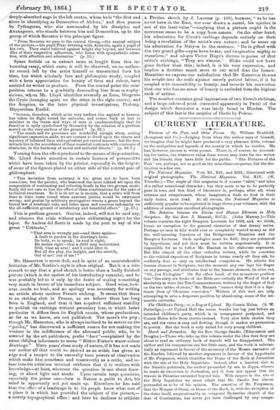The Relation between the Divine and Human Elements in Holy
Scripture. By the Rev. J. Hannah, D.C.L. (John Murray.)—This volume contains the eight Bampton Lectures for 1863, and, we think, forms no exception to the general character of that dreary series. Perhaps no men in this world over so completely wasted money as did the well-meaning founders of the Bridgewater Treatises and the Bampton Lectures. Such apologies must be dull; they are polemical by hypothesis, and yet they must be written unpolemically. It is impossible for us to follow Mr. Hannah in his elaborate argument. But like almost all the other orthodox writers, while he concedes to the critical expositors of Scripture in terms nearly all they ask, ho evidently does so only on intellectual compulsion. He admits the human element in Scripture, but the moment any one lays his finger on any passage, and attributes that to tho human element, he cries out, "Oh, you Neologian." On fho other hand, of the monstrous position that "the sixty-six books of the Bible are verbally the Word of God as absolutely as were the Ten Commandments written by the finger of God on the two tables of stone," Mr. Hannah "cannot deny that it is a legi- timate form of Christian conviction." Writers of this sort are only attempting to save a desperate position by abandoning some of the un- tenable outworks.






























 Previous page
Previous page